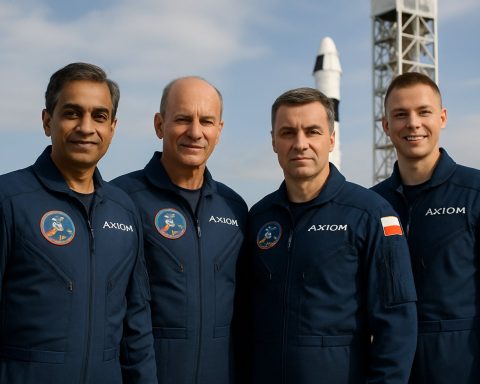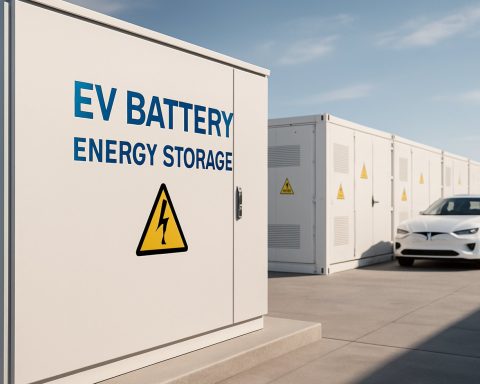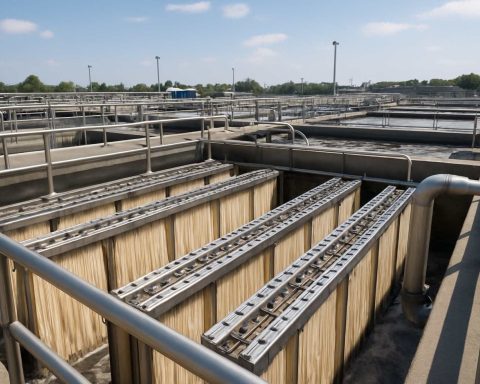- India and France are collaborating to advance nuclear energy through the development of innovative reactors.
- The focus is on modular reactors, including small modular reactors (SMRs), which offer versatility and enhanced safety with compact designs.
- India aims to establish five SMRs by 2033, reflecting its commitment to incorporating nuclear energy into its power strategy.
- India’s nuclear capacity has increased significantly and is projected to triple by the next decade.
- France contributes its NUWARD reactor design, emphasizing safety and competitiveness in the pressurized water reactor field.
- The Indo-French partnership is seen as pivotal in fostering a sustainable and secure energy future globally.
Amidst the bustling heart of New Delhi, a meeting of minds between India and France plants the seeds for a nuclear future that promises innovation and sustainability. In a significant stride forward, Prime Minister Narendra Modi and President Emmanuel Macron have charted a collaborative course to develop advanced nuclear reactors. These agreements, forged in steel and science, beckon a future where nuclear energy plays a pivotal role in curbing carbon emissions and bolstering global energy security.
The focus lies on advanced modular reactors and small modular reactors (SMRs), both marvels of engineering that herald versatility and safety. Unlike their colossal predecessors, these reactors boast a compact design, making them ideal candidates for assembly in locations where sprawling power plants are impractical. With a punch of up to 300 MW, they’re designed to energize places where traditional giants can’t reach.
As India eyes the ambitious goal of establishing five SMRs by 2033, its commitment to nuclear energy as a cornerstone of its power strategy becomes clear. Nuclear capacity has seen a surge from 4,780 MW in 2014 to 8,180 MW in 2024, with projections set to triple by the next decade.
France, leading with its revolutionary NUWARD design, underpins this joint venture, promising safety and competitive edge in the pressurized water reactor domain. The fusion of French expertise with Indian ambition sets the stage for a nuclear renaissance that aims for a cleaner, more secure energy landscape.
This Indo-French alliance is more than a partnership; it’s a beacon guiding the world towards a sustainable future. As the globe grapples with carbon footprints and energy dilemmas, the echoes of this collaboration will resonate, urging nations to rethink and revamp their energy blueprints.
India and France’s Nuclear Revolution: A Game-Changer for Global Energy
In the vibrant heart of New Delhi, a groundbreaking collaboration between India and France unveils a nuclear future rooted in innovation and sustainability. Prime Minister Narendra Modi and President Emmanuel Macron have united to advance the development of cutting-edge nuclear reactors, positioning nuclear energy as a key player in reducing carbon emissions and enhancing global energy security.
New Technological Horizons: Advanced Modular Reactors
The ambitious partnership focuses on advanced modular reactors and small modular reactors (SMRs), engineering feats known for their versatility and safety. Unlike their large predecessors, these reactors feature a compact design perfect for areas where traditional power plants are unfeasible. Capable of producing up to 300 MW, they offer energy solutions for regions that conventional power giants cannot serve.
Nuclear Energy: A Strategic Cornerstone for India
India is setting its sights on establishing five SMRs by 2033, underscoring its commitment to nuclear power as a core element of its energy strategy. India’s nuclear capacity has surged from 4,780 MW in 2014 to 8,180 MW in 2024, with plans to triple by the next decade. This marks a significant leap in diversifying the country’s energy portfolio, aiming to meet increasing demands sustainably.
France’s Leading Role: The NUWARD Design
France, with its pioneering NUWARD design, plays a pivotal role in this venture, offering a competitive and safe pressurized water reactor solution. The collaboration merges French technological expertise with Indian ambition, paving the way for a nuclear renaissance aimed at fostering a cleaner and more secure energy realm.
Global Significance and Impact
How does this collaboration affect global energy dynamics?
The Indo-French nuclear partnership serves as a beacon, urging countries worldwide to reconsider and revamp their energy blueprints. By spearheading the development and deployment of advanced nuclear technologies, this alliance highlights nuclear power’s potential to address global energy challenges sustainably.
What are the environmental implications?
Nuclear energy is a low-carbon power source. The increased deployment of nuclear power through SMRs could significantly contribute to global carbon reduction efforts, aligning with international climate goals.
Could this influence other countries’ energy policies?
Yes, the success of this collaboration could inspire other nations to adopt similar approaches, driving a broader shift towards advanced nuclear technology in pursuit of sustainable energy solutions.
Conclusion
The partnership between India and France heralds a new era in nuclear technology, potentially transforming the global energy landscape. As countries strive to reduce carbon footprints and secure energy supplies, the impact of this collaboration will resonate worldwide, charting a course toward a cleaner, more sustainable future.
For more information about the participants’ respective nuclear industries, you can visit:
– India Government Portal
– Official French Website











